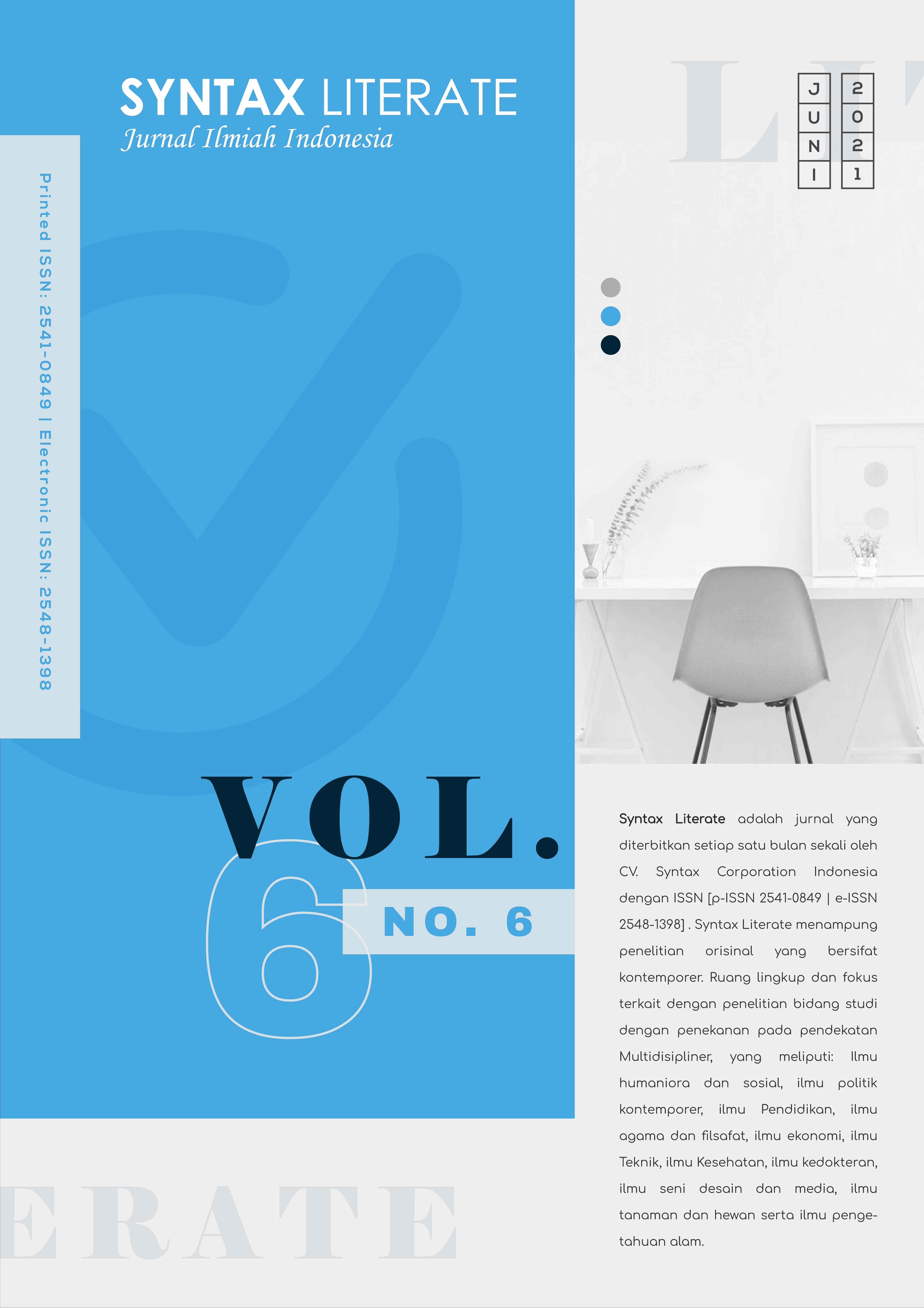Gangguan Kognitif pada Pasien Pasca Sembuh Dari Covid-19
Abstract
Pasien yang sembuh dari Covid-19 memiliki beberapa keluhan pada daya ingat. Virus corona dapat menembus ke SSP (Sistem Saraf Pusat) dan cairan serebrospinal dalam waktu kurang dari seminggu. Pemeriksaan histopatologi otak pasien Covid-19 yang meninggal menunjukkan potensi SARS-CoV-2 menginfeksi ke sistem saraf pusat (SSP). Neuro inflamasi juga dapat merusak BBB (Blood Brain Barier). Setelah BBB terganggu, sitokin dapat masuk ke SSP dan menyebabkan aktivasi mikroglial dan stres oksidatif, yang menyebabkan gangguan kognitif. Metode Penelitian dilakukan secara cross sectional random sampling terhadap pasien di Ruang Isolasi Covid-19 Rumah Sakit Tingkat II. Prof. dr. J.A Latumeten Ambon selama periode Maret 2020 sampai dengan Maret 2021 dengan melakukan wawancara menggunakan Telephone Interview for Cognitive Status-M (TICS-M) yang terdiri dari 22 pertanyaan dengan total nilai 50. Dari 167 pasien, terdapat 54 pasien yang bersedia di wawancara dan terdapat 28 pasien yang memiliki kecenderungan gangguan cognitive ringan dengan rentang usia 31-40 tahun. Penelitian ini menemukan bahwa nilai TICS-M pada pasien pasca Covid-19 berhubungan dengan usia, namun tidak berhubungan dengan jenis kelamin dan lamanya pendidikan.
Downloads
References
Baker, Hanan A., Safavynia, Seyed A., & Evered, Lisbeth A. (2021). The ‘third wave’: impending cognitive and functional decline in COVID-19 survivors. British Journal of Anaesthesia, Vol. 126. https://doi.org/10.1016/j.bja.2020.09.045 Google Scholar
Brandt, Jason, Spencer, Miriam, & Folstein, Marshal. (1988). The telephone interview for cognitive status. Neuropsychiatry, Neuropsychology and Behavioral Neurology, 1(2). Google Scholar
Cardenas, V. A., Chao, L. L., Studholme, C., Yaffe, K., Miller, B. L., Madison, C., Buckley, S. T., Mungas, D., Schuff, N., & Weiner, M. W. (2011). Brain atrophy associated with baseline and longitudinal measures of cognition. Neurobiology of Aging, 32(4). https://doi.org/10.1016/j.neurobiolaging.2009.04.011 Google Scholar
Cook, Sarah E., Marsiske, Michael, & McCoy, Karin J. M. (2009). The use of the modified telephone interview for cognitive status (Tics-M) in the detection of amnestic mild cognitive impairment. Journal of Geriatric Psychiatry and Neurology, 22(2). https://doi.org/10.1177/0891988708328214 Google Scholar
Dichter, Melissa E., Teitelman, Anne, Klusaritz, Heather, Maurer, Douglas M., Cronholm, Peter F., & Doubeni, Chyke A. (2018). Trauma-informed care training in family medicine residency programs: Results from a CERA survey. Family Medicine, 50(8). https://doi.org/10.22454/FamMed.2018.505481 Google Scholar
Hasra, Indha Wardhani P. L., Munayang, Herdy, & Kandou, Joice. (2014). Prevalensi Gangguan Fungsi Kognitif Dan Depresi Pada Pasien Stroke Di Irina F Blu Rsup Prof. Dr. R. D. Kandou Manado. E-CliniC, 2(1). https://doi.org/10.35790/ecl.2.1.2014.3616 Google Scholar
Hayat, Umar, Ahmed, Saqib, Hussain, Mohammed, & Hameed, Nasir. (2020). Encephalopathy as the Presenting Symptom of Covid-19. Kansas Journal of Medicine, 13. https://doi.org/10.17161/kjm.vol13.14766 Google Scholar
Knopman, David S., Roberts, Rosebud O., Geda, Yonas E., Pankratz, V. Shane, Christianson, Teresa J. H., Petersen, Ronald C., & Rocca, Walter A. (2010). Validation of the telephone interview for cognitive status-modified in subjects with normal cognition, mild cognitive impairment, or dementia. Neuroepidemiology, 34(1). https://doi.org/10.1159/000255464 Google Scholar
Mazza, Mario Gennaro, Palladini, Mariagrazia, De Lorenzo, Rebecca, Magnaghi, Cristiano, Poletti, Sara, Furlan, Roberto, Ciceri, Fabio, Rovere-Querini, Patrizia, Benedetti, Francesco, & group, Covid 19 BioB Outpatient Clinic Study. (2021). Persistent psychopathology and neurocognitive impairment in COVID-19 survivors: effect of inflammatory biomarkers at three-month follow-up. Brain, Behavior, and Immunity, 94, 138–147. Google Scholar
Nierwińska, Katarzyna, Żebrowska, Aleksandra, Malecka, Elżbieta, Chalimoniuk, Małgorzata, & Langfort, Józef. (2008). Blood-Brain Barrier and Exercise - a Short Review. Journal of Human Kinetics, 19. https://doi.org/10.2478/v10078-008-0006-x Google Scholar
Nugraha, Boya, Wahyuni, Luh Karunia, Laswati, Hening, Kusumastuti, Peni, Tulaar, Angela Bm, & Gutenbrunner, Christoph. (2020). Covid-19 pandemic in Indonesia: Situation and challenges of rehabilitation medicine in Indonesia. Acta Medica Indonesiana, Vol. 52. Google Scholar
Ritchie, Karen, Chan, Dennis, & Watermeyer, Tam. (2020). The cognitive consequences of the Covid-19 epidemic: collateral damage? Brain Communications, 2(2). https://doi.org/10.1093/braincomms/fcaa069 Google Scholar
Saleki, Kiarash, Banazadeh, Mohammad, Saghazadeh, Amene, & Rezaei, Nima. (2020). The involvement of the central nervous system in patients with Covid-19. Reviews in the Neurosciences, 31(4). https://doi.org/10.1515/revneuro-2020-0026 Google Scholar
Sheraton, Mack, Deo, Neha, Kashyap, Rahul, & Surani, Salim. (2020). A Review of Neurological Complications of Covid-19. Cureus. https://doi.org/10.7759/cureus.8192 Google Scholar
Tracey, Kevin J. (2018). Neurons Are the Inflammatory Problem. Cell, Vol. 173. https://doi.org/10.1016/j.cell.2018.05.005 Google Scholar
Van Den Berg, Esther, Ruis, Carla, Biessels, Geert Jan, Kappelle, L. Jaap, & Van Zandvoort, Martine J. E. (2012). The telephone interview for cognitive status (modified): Relation with a comprehensive neuropsychological assessment. Journal of Clinical and Experimental Neuropsychology, 34(6). https://doi.org/10.1080/13803395.2012.667066 Google Scholar
Vila, Jordi, Bosch, Jordi, & Muñoz-Almagro, Carmen. (2020). Molecular diagnosis of the central nervous system (CNS) infections. Enfermedades Infecciosas y Microbiologia Clinica. https://doi.org/10.1016/j.eimc.2020.03.001 Google Scholar
Woo, Marcel S., Malsy, Jakob, Pöttgen, Jana, Seddiq Zai, Susan, Ufer, Friederike, Hadjilaou, Alexandros, Schmiedel, Stefan, Addo, Marylyn M., Gerloff, Christian, Heesen, Christoph, Schulze Zur Wiesch, Julian, & Friese, Manuel A. (2020). Frequent neurocognitive deficits after recovery from mild COVID-19. Brain Communications, 2(2). https://doi.org/10.1093/braincomms/fcaa205 Google Scholar











